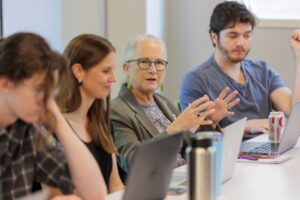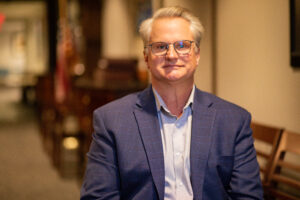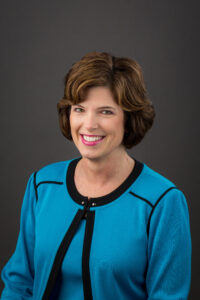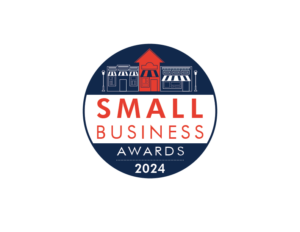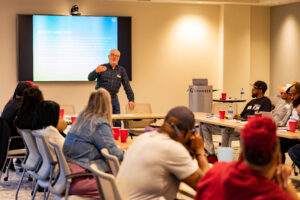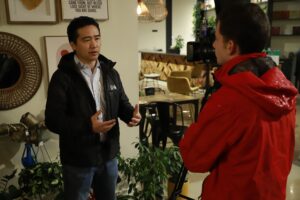For most of the world, spring 2020 felt like some post-apocalyptic movie playing out in real life. We all were the protagonist who woke up after a brief sleep to find the world around us alarmingly different, and tasked with quickly catching up to survive. For many companies, that meant shuttering their doors and figuring out how to keep working despite employees being physically and mentally spaced out, dazed by the challenge of caring for loved ones and maintaining a career during a pandemic. While some employers were familiar with remote work setups, others found themselves padding around in the dark. Having never heard of Zoom or Microsoft Teams — let alone used it — they scrambled to quickly implement a structure and routine that would keep operations intact while the country paused to slow the spread for two weeks. Fast forward two years, and most Chattanooga and Hamilton County businesses that were able to have adapted to a new remote-work normal, while our area has enjoyed an influx of new residents newly unburdened by the need to live where they work.
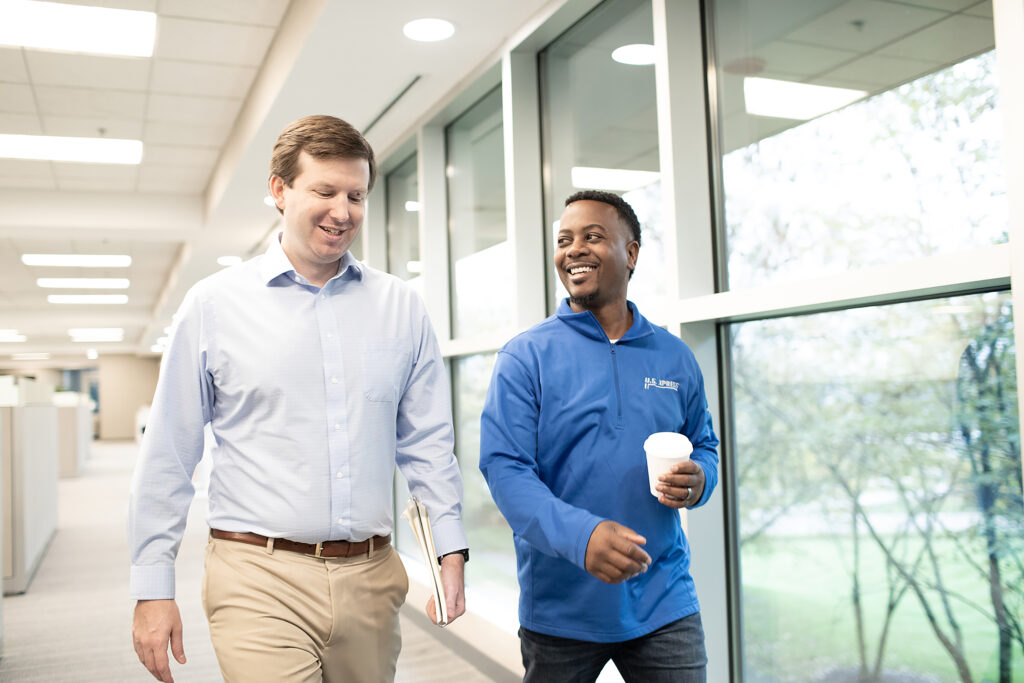
The Book of E-Li(beration)
“People were actually lifting their desktop computers and all of their work equipment and putting it in their cars to go home,” says Amand Thompson, Chief People Officer, U.S. Xpress. She chuckles warmly, then continues. “That experience was crazy, but we proved to be extremely resilient.”
Thompson expressed gratitude for the past being firmly in the past as she explains how logistics company U.S. Xpress went from less than 5% of its workforce working from home to a large portion of its 1,400 employees working remotely.
U.S. Xpress immediately implemented multiple daily checkpoints via Microsoft Teams, a video conferencing and collaboration platform that had been present — but hardly used — on most employees’ computer desktops. They also took their monthly in-person company town hall meeting virtual — a move that allowed employees outside Chattanooga to engage in real time.
“We have locations all across the United States, so there was a big gap in communication,” Thompson says. “Now, everybody can log in to the same town hall and be there to hear the message at the same exact time, and we’re able to cascade that message so much easier now than we did when we were in person.”
While daily checkpoints have since whittled down to weekly ones, Thompson says going virtual has kept team members aligned on short-and long-term goals by making communication more meaningful and efficient.
And the impact on production has been notable. So much so, that U.S. Xpress recently announced a brand-new work structure, wherein most employees can enjoy the option to work some portion of the work week from home.
“You can see that productivity is much better,and I think it’s because employees are not as stressed,” Thompson says. “They can be at home with their families. They can have that work-life balance, and it helps them be more efficient and more productive over time.”
The John Connor of Remote Work
Every post-apocalyptic world needs a champion, a hero willing to rise above the fray to battle the prevailing threat — Neo to the Matrix, John Connor to Skynet, Katniss Everdeen to the Capitol. During the pandemic, the savior of the business community came in the form of video conferencing technology.
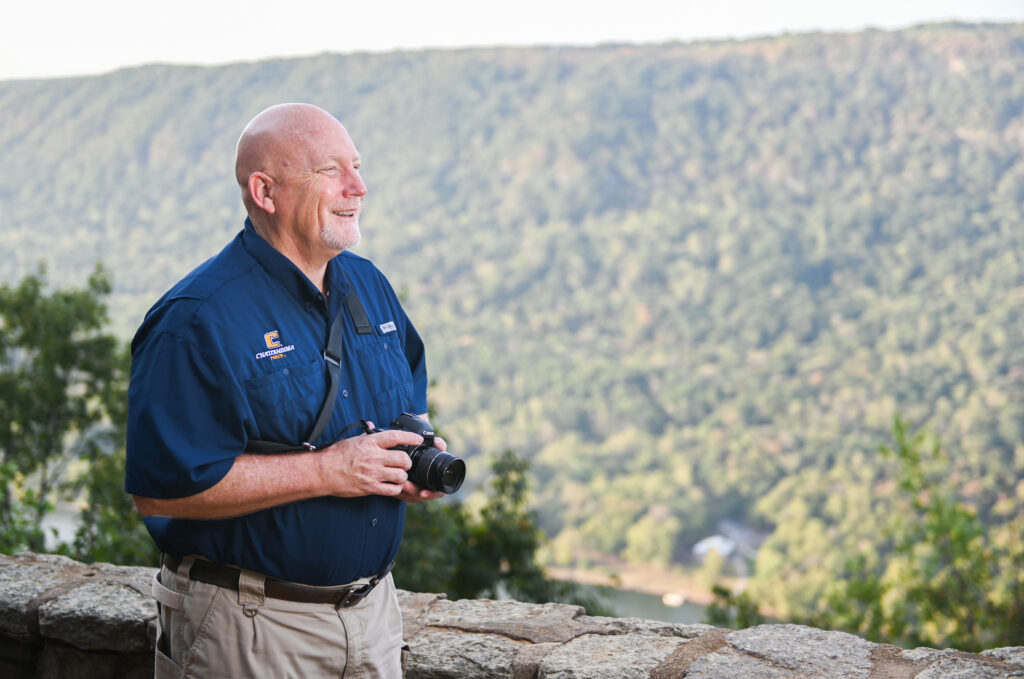
Online platforms such as Microsoft Teams played a huge role in the success of companies like U.S. Xpress. The software grew from 20 million daily active users (DAUs) in November 2019 to 44 million DAUs in March 2020. The trend toward working from home, as well as an uptick in video gaming, helped Microsoft shatter profit expectations for the year.
‘Zoom’ took on a whole new meaning as the video conferencing app saw a 2,000% increase in daily (non-unique) meeting participants over roughly the same timeframe.
In academic institutions, professors began using apps such as Canvas and Kaltura to create a virtual semblance of a traditional classroom space.
University of Tennessee at Chattanooga faculty and students made the most of a mix of several recording, streaming, editing and meeting tools to take courses fully online within one week of transitioning out of the physical classroom. An equipment loan program for computers and hotspots also helped solve resource issues.
“When we initially transitioned, we had many students from more rural parts of the state who had trouble with course access either because they lacked devices to access classes or didn’t have reliable Internet connections,” says Jerold Hale, Ph.D., Provost and Senior Vice Chancellor for Academic Affairs, UTC. “The UTC Library staff and UTC IT staff stepped up in a hurry.”
By Fall 2020, remote work was becoming ingrained in the fabric of many modern businesses and institutions. And with working and learning from home becoming so prevalent, many people began to ask themselves: Where do I want that home to be?
Zoombieland (Or: The Sound of Success)
Prior to 2020, the most well-known commercial use of ‘zoom’ was either the catchy ‘zoom zoom’ refrain on Mazda’s 2015 Miata commercial or the Queen of Soul’s 1980s classic “Who’s Zoomin’ Who?” In fact, company founders give credit to the 1998 toddler book “Zoom City” by Thacher Hurd. Who knew then the power such an onomatopoeia-embracing name would have on our daily lives many decades later?
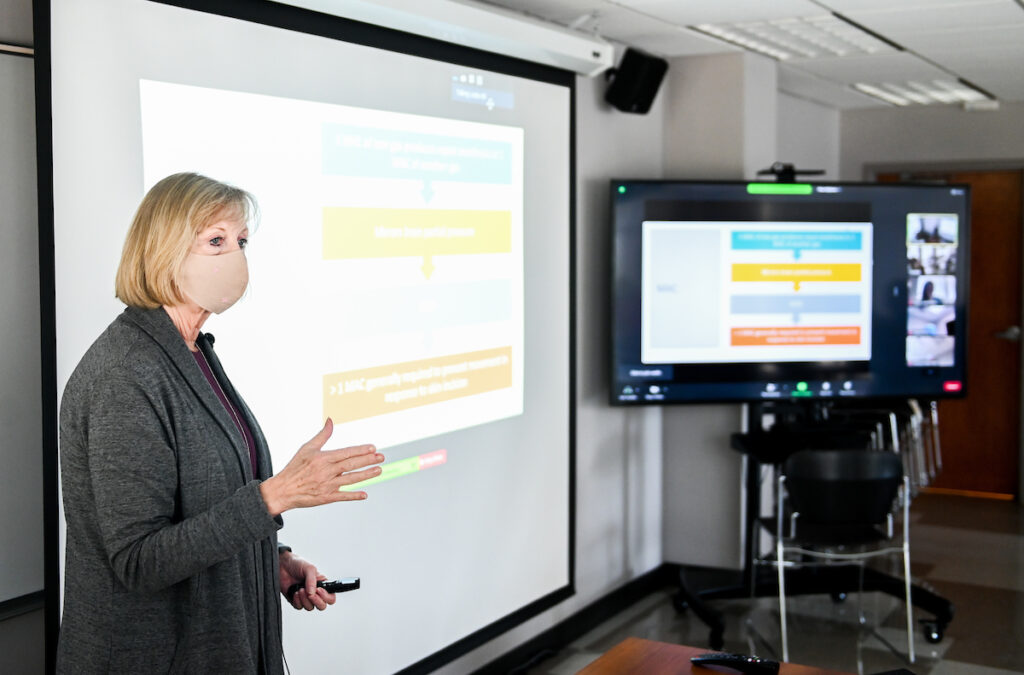
Escape From San Francisco
When San Francisco-based Unity Technologies made arrangements for employees to work from home in 2020, it was with the understanding that a more concrete timeline would be forthcoming.Then in August of that year, the real-time 3D software company announced remote work would be indefinite. Two months later, Rachel Pohl and her husband stored their belongings, packed up their Subaru, and hit the road.
Working remotely from short-term rentals, the couple spent three to five weeks in any given location. And when they weren’t on the clock, they explored their newfound temporary homes, checking town after town off their to-see list.

“We knew we wanted to leave San Francisco,but we were sort of paralyzed in terms of ‘Where do we go?’,” says Pohl, who oversees philanthropic giving, ESG, and social impact at Unity Technologies. “We took the opportunity to live nomadically for a year — and not necessarily with the intention of testing out different places to live at that time —just more going to places that we wanted to visit and spending time there.”
In July 2021, when the couple discovered they were expecting a child, the search for a more permanent home began. They knew they wanted to settle down in a smaller city in the Southeast, so they flew to Durham, N.C., where they had family friends. They soon began house hunting, but after a few weeks, Pohl says she felt like something was missing.
“On paper, Durham made a lot of sense,” Pohl says, referencing the number of young professionals and established tech community. “But being able to choose a city and be there because we loved it — we didn’t feel the connection.”
After taking a few weekend trips to Chattanooga, which they had briefly visited during the previous year, the pair decided to put down roots in Scenic City in September 2021.
“We had been thinking about leaving San Francisco for a long time, but we wouldn’t have known or chosen Chattanooga, or even visited [before the pandemic],” Pohl says. “Remote work just opened up all these opportunities to actually leave and not be tied to an office.”
A Quaint Place
Pohl and her husband’s story is one of many about people flocking to Chattanooga during the pandemic. In fact, citing benefits such as affordable housing and an abundance of outdoor recreation, Time Out magazine named Chattanooga the No. 1 U.S. destination for people looking to work from home in 2020.
And perhaps the largest consideration for people relocating to the Scenic City is access to the Western hemisphere’s fastest citywide Internet through EPB, which reported a 75% increase in internet broadband usage after the pandemic began.
Randal Harrell, Market Executive, Synovus Bank, says the draw of Chattanooga lured several employees here.
“We have three individuals who have recently moved here from the Naples, Florida area,” says Harrell, whore located from Nashville in January.“ As long as they were within our Synovus footprint, they had the freedom to pick where they wanted to go and all three picked Chattanooga.”
Based on the most recent U.S. Census estimates, Chattanooga and Hamilton County saw marginal population increases — by .07% and .06%,respectively — from 2020 to 2021.That’s compared with other Tennessee metros such as Memphis, which experienced a population decline. Andan analysis of pandemic moving trends from relocation company PODS shows Chattanooga was the No. 4 growth city in the nation, experiencing more than twice the amount of arrivals than departures of residents in 2020.
28² Days Later
It’s been nearly 800 days since employees began working from home in response to the pandemic, and many employers have begun to weave remote culture into their long-term approach to work.
In 2021, U.S. Xpress leaders began evaluating each company role to measure its viability as a permanent remote-work position. During a March 2022 town hall meeting, they launched a new work model comprised of four categories. Depending on the position, employees have the option to work fully in person, mostly at home, mostly in person, or fully remote (with occasional office time, as required). Thompson says they are also reimagining interior office design to include more collaborative workspaces.
“We’re going to consider most all of those positions — if a position becomes open — to hire nationally to get the best person for the role, knowing we will bring them into the office for those specific purposeful, meaningful collaboration sessions as needed,” Thompson says.
Because of the shift toward more remote employees, the company’s onboarding process also changed. As part of the “Launch” orientation program U.S. Xpress new hires converge on Chattanooga for two to three days to immerse themselves in the company story and job specifications, while also becoming familiar with the city. Launches are held every two weeks, with the exception of those tailored to leadership roles, which will occur monthly.
At both Synovus Bank and UTC,operations are shifting more toward a pre-pandemic approach. Hale says about 70% of UTC classes have returned to in person, compared with 30% online. However, the experience of going fully virtual during the pandemic will continue to inform the way the university approaches education. “The transitions we’ve gone through have increased faculty willingness to teach online and the willingness of students to enroll in online courses. It has made us more innovative,” Hale says.
He also points to previously underserved populations, specifically in East Tennessee, that will benefit from an increased online presence, saying UTC is now better equipped “to meet students where they need us to be.”
While Synovus Bank is mostly in office now, Harrell says the pandemic has softened the sometimes rigid constructs surrounding work environment.
“There is flexibility if someone needs to work from home,” Harrell says. “We cater to what the employee might need, depending on if we’re in [office], or remote or somewhere inbetween.”
For fully remote workers, such as Pohl and her husband, the flexibility of working anywhere has allowed them to put down roots in Chattanooga, despite being three time zones away from their home offices. The couple welcomed their baby in March, and Pohl says they have been able to build a community quickly here.
“We really chose Chattanooga in large part because of this amazing community that you can just feel even when you’re here for a brief amount of time,” Pohl says. “People are so kind and welcoming. Chattanooga really is this small town that has the amenities and access of a larger city.”
Maggie Neff is a freelance writer, amateur baker and former Chattanoogan living in Saint Simons Island, Georgia. Contact her at [email protected].

